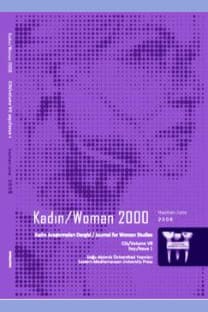Neoliberal Burdens for Women in Academy: 'How Dare We Not Work'
Bu makale, dijital hikaye anlatımının akademide karşılaşılan neoliberal söylemlere dair kaygılarını dile getirebilmesini sağlayan ortamı sunma potansiyelini tartışmaktadır. Yüksek öğretimde neoliberal söylemlere feminist müdahaleleri içeren okumalara dayanarak ve bunlarla dijital hikaye anlatımının taban hareketleri kökenli seyri içinde, Türkiye'deki uygulamanın feminist zemininden hareket ediyorum. Doğu Akdeniz Üniversitesi'nde 5. Uluslararası Toplumsal Cinsiyet Çalışmaları Konferansı öncesinde bir konferans ön etkinliği olarak 2015 Mart ayında gerçekleştirdiğimiz bu dijital hikaye anlatımı atölyesi ile akademide feminist perspektifleri ile konumlanmış akademisyen kadınların hikayelerini yaratmalarını sağlamanın yanı sıra konferans programına yerleştirilen özel gösterim seansı ile bu dijital hikayeler üstünden bir tartışma açmayı hedefliyorum. Bu makale, dijital hikaye anlatımının akademide ve akademi dışı örgütlenmeler içinde konumlanan feminizmlerin buluşmalarını arttıracak bir potansiyele sahip olduğuna dair bir iddia geliştirmektedir.
Akademideki Kadınların Neoliberal Sıkıntıları: 'Olur Mu Hiç Çalışmamak'
In this article, I discuss the potential of digital storytelling as a site where feminist scholars in academia can get together to reflect upon their concerns about neoliberal burdens in academia. I rely on the recent literature about the feminist interventions in higher education in addition to giving an account of the grass-roots digital storytelling movement around the world and its feminism oriented journey in Turkey. Focusing on the digital stories told at the pre-conference digital storytelling workshop in EMU (Eastern Mediterranean University) immediately before the 5th International Conference on Gender Studies in March 2015, the aim of that digital storytelling workshop was not only to facilitate the creation of digital stories told by feminist academics but also to carry these digital stories into the program of the conference in a special session that hosted both the screening of these digital stories and an open discussion about our neoliberal concerns in academia and everyday life. This article also provides an account of the main discussions and attempts to suggest the digital storytelling workshop as a tool for broadening the interactions between academic and activist feminisms.
___
Coşar S. & Ergül H. (2015). Free Marketization of Academia through Authoritarianism: The Bologna Process in Turkey. Alternative Routes: A Journal of Critical Social Research, 26:101-124.David M. & Clegg S. (2008). Power, Pedagogy and Personalization of Global Higher Education: The Occlusion of Second-Wave Feminism? Discourse: Studies in Cultural Politics of Education,29(4): 482-498.
Giroux H.; Apple M.; McLaren P.; Freire P. & Harvey D. (2009). Eleştirel Pedagoji Söyleşileri. (Trans: Eylem Çağdaş Babaoğlu). İstanbul: Kalkedon
İnce Ş. (forthcoming, 2015). The Pot, the Cup and the Jar: Coming Together in/for Stories. Journal of Cultural Science, 5(2): N/A.
Hart J. (2008). Mobilization Among Woman Academics: The Interplay between Feminism and Professionalization. NWSA Journal, 20(1):184-208.
Hartley J. & McWilliam K. (2009). Story Circle: Digital Storytelling Around the World. West Sussex: Wiley-Blackwell.
Kabakcı-Zeybek G.(2012). Eğitimli Kadınların Gündelik Hayatını Kuşatan Korkular. İletişim Araştırmaları, 10(1-2): 47-76.
Köker E. (1996). Feminist Alternatif Medya. İçinde, Ankara Üniversitesi İletişim Fakültesi Yıllık 1995/1996: 23-44.
Şimşek B. (2013). Darısı Sizlerin Başına: Sözün Ötesinde Sesin Eşitlik Arayışı. In, Güven-Lisaniler F. & Üçışık-Erbilen S. (Eds.), Gender Equality and the Law: 4th International Conference on Gender Studies Conference Proceedings. Famagusta: EMU Press: 299-309.
Şimşek B. (2012b).Enchancing Women's Participation in Turkey Through Digital Storytelling. Journal of Cultural Science, 5(2): 28-46.
Şimşek B. (2012a). Using Digital Storytelling for Women's Participation in the Turkish Public Sphere. PhD. Thesis, Queensland University of Technology: Brisbane.http://eprints.qut.edu.au/50894.
Webber M. (2008). Miss Congeniality Meets the New Manageralism: Feminism, Contingent Labour and the New University. Canadian Journal of Higher Education, 38(3): 37-56.
Vatansever A. & Yalçın-Gezici M. (2015). Ne Ders Olsa Veririz: Akademisyenin Vasıfsız İşçiye Dönüşümü. İstanbul: İletişim Yayınları.
- ISSN: 1302-9916
- Yayın Aralığı: Yılda 2 Sayı
- Başlangıç: 2000
- Yayıncı: Doğu Akdeniz Üniversitesi Kadın Araştırmaları ve Eğitimi Merkezi
Sayıdaki Diğer Makaleler
Neo-liberal Zamanlarda Feminist Teori: Özneye Yeni Yaklaşımlar
ELİFHAN KÖSE ÇAL, ARZU MALTAŞ EROL
Representation of Women Power in TV Commercials: The Use of Super Heroes
Neoliberal Burdens for Women in Academy: 'How Dare We Not Work'
Nancy LİNDİSFARNE, Jonathan NEALE
Neoliberal Burdens for Women in Academy: 'How Dare We Not Work'
Neoliberalism, Food and Women: A Narcissistic Culinary Culture?1
